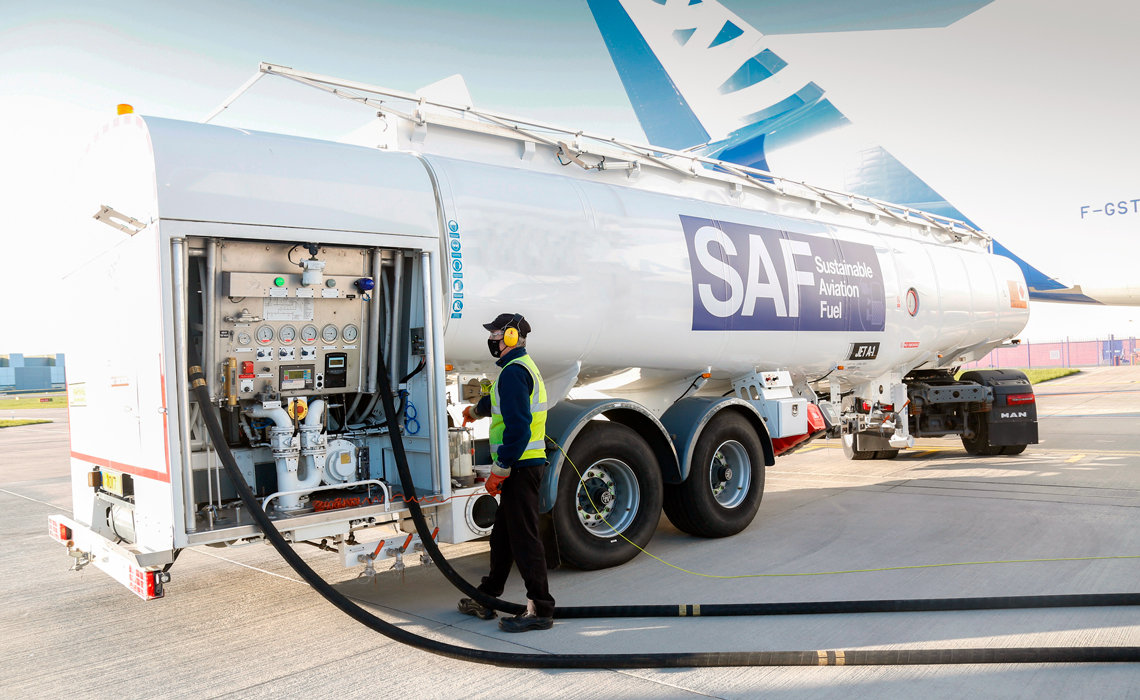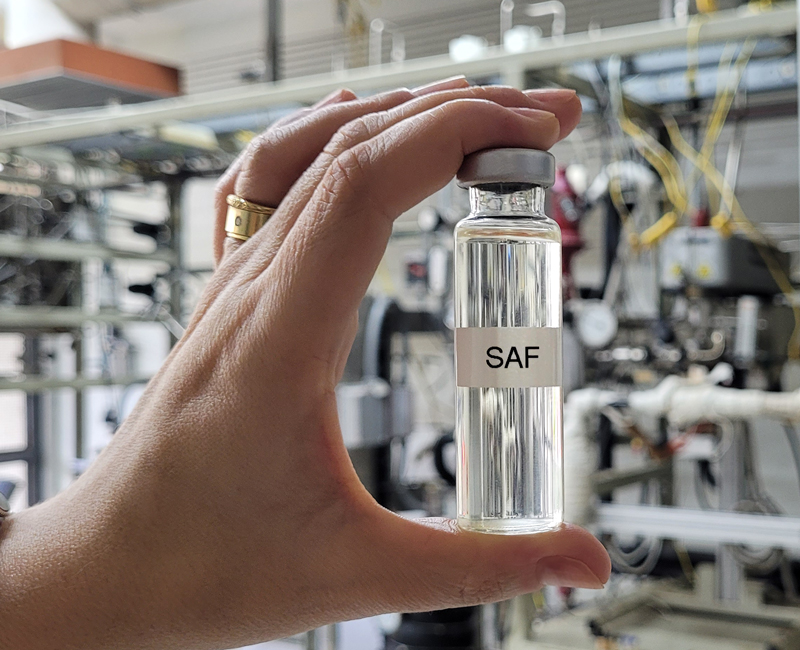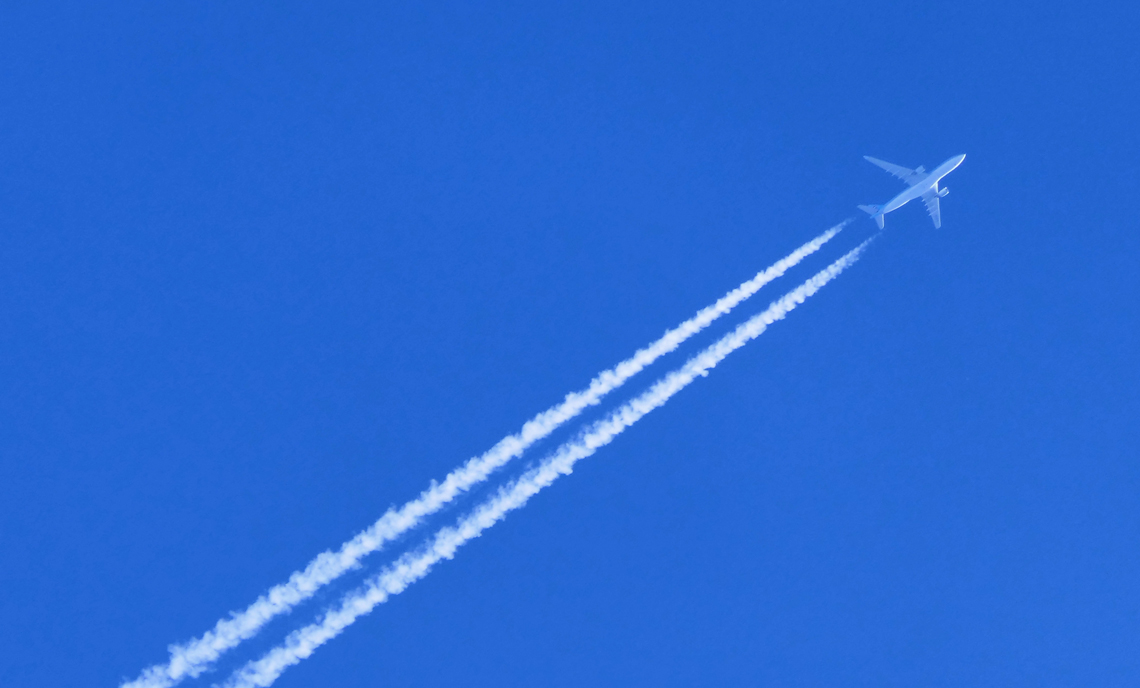At the end of 2023, British airline Virgin Atlantic flew a Boeing 787 from London to New York powered 100% by sustainable fuel. As the first transatlantic flight by a major commercial aircraft that did not use a single drop of fossil-based aviation kerosene, the historic event made headlines around the world. The airline stated that the alternative fuel, made from used cooking oil, animal fat, and 12% synthetic aromatic kerosene — which does not come from fossil sources — reduced greenhouse gas (GHG) emissions by up to 70% compared to flying the same route using traditional jet fuel.
Virgin Atlantic had to obtain special authorization for the demonstration flight. Current regulations issued by the American Society for Testing and Materials (ASTM) — also followed by Brazil’s National Petroleum, Natural Gas and Biofuels Agency (ANP) — only allow airlines to use a maximum of 50% sustainable aviation fuel, better known by the acronym SAF.
Various technologies and raw materials are used to produce SAF, ranging from oilseeds to ethanol and urban solid waste. What all these inputs share in common is that they contain carbon, the main precursor of the hydrocarbons that make SAF.
– SAF Studies advance in the country
The aim is for planes to be fueled with aviation kerosene or SAF, or a mixture of the two. The molecules of SAF are practically identical to those of fossil-based kerosene, meaning no changes need to be made to aircraft engines and fueling infrastructure.
The amount of SAF in the fuel mix is restricted to 50% for safety reasons. “Not all SAF production methods lead to a sufficient amount of aromatic hydrocarbons, which are essential to ensuring the fuel maintains the same viscosity and does not freeze at high altitudes,” explains Fernando Catalano, director of the São Carlos School of Engineering at the University of São Paulo (EESC-USP).
Fossil kerosene is composed of a mixture of various hydrocarbon types and usually contains between 10% and 25% aromatics, which are considered pollutants but are necessary. “It is a problem that has not yet been resolved, but it will have to be overcome at some point,” says Catalano, highlighting two other current obstacles to the large-scale adoption of SAF: global production capacity is still very small compared to demand, and the cost is estimated at between three and five times that of aviation kerosene.
Brazilian aerospace company Embraer, headquartered in São José dos Campos, has also been testing SAF in its planes. In June 2022, one of its E195-E2 commercial jets made a flight with 100% biofuel in one of its two engines. Later, in October 2023, two of the company’s executive jets completed test flights powered entirely by SAF.
The airline sector has set a global target of zero carbon emissions by 2050
The barriers to decarbonization
Sustainable aviation fuel is the airline sector’s best hope for quickly reducing its carbon footprint. Aviation is responsible for approximately 2% of all global carbon dioxide (CO2) emissions, releasing 800 million tons of the gas into the atmosphere every year. It is considered one of the most difficult sectors to decarbonize, and airplanes are one of the most polluting modes of transport.
In 2022, the member states of the International Civil Aviation Organization (ICAO) approved a global target of zero carbon emissions in the sector by 2050. At a meeting in the United Arab Emirates at the end of 2023, they further committed to reducing the CO2 emissions of international aviation by 5% by 2030.
More than 600 million liters of SAF were produced in 2023, double the previous year, according to the International Air Transport Association (IATA). Production is expected to triple this year. Despite the increase, the expected volume will represent just 0.53% of global demand for aviation fuel. The USA, China, Japan, Singapore, Germany, Norway, and Mexico currently manufacture SAF.
“It is still unclear who will be the major suppliers of SAF in the future, but it is most likely to be the oil companies that currently produce aviation kerosene,” says Catalano, who is also a member of the ICAO’s independent panel for the environmental impact of aviation.
With the growth expected over the coming years in the airline sector, which is still recovering from the pandemic, emissions reductions achieved through technological innovation, new more efficient aircraft, and optimized operations are unlikely to be enough. Alternative fuels will be needed to achieve the zero-carbon target. “The IATA estimates that SAF will contribute more than 60% toward net zero emissions by 2050,” says Catalano.
In a global industry that is still in its infancy, Brazil has an opportunity to position itself as a central player, say experts — due both to the country’s experience producing biofuels and the amount of biomass available to manufacture SAF. “If there is one place in the world where the large-scale production of SAF will succeed, it’s Brazil,” emphasizes Glaucia Mendes Souza, a biochemist from USP’s Chemistry Institute and one of the managers of the FAPESP Bioenergy Research Program (BIOEN).

Airbus / Jane Widdowson / Beetroot Aircraft made by European manufacturer Airbus being fueled with aviation biofuelAirbus / Jane Widdowson / Beetroot
“We have an abundance of various inputs needed to produce the fuel, including ethanol. But for now, the method for converting ethanol into sustainable aviation fuel, known as Alcohol-to-Jet [ATJ], is not economically competitive,” says the researcher. “The HEFA method [Hydroprocessed Esters and Fatty Acids] offers better value. But the problem with this is sustainability. Some countries, mainly in Europe, do not want to use palm oil, which is the oilseed with the highest productivity in Brazil.”
The two production methods most commonly approved are HEFA and ATJ, with the former, which was used in the Virgin Atlantic demonstration flight, accounting for more than 80% of current global SAF production. Europe does not consider palm oil sustainable because it is often produced via predatory practices through the destruction of native forests, especially in Southeast Asia.
Sustainable aviation fuel is not yet being produced on a commercial scale in Brazil, but several projects are making headway. In Natal, Rio Grande do Norte, the Senai Institute for Innovation in Renewable Energy (ISI-ER) inaugurated a pilot SAF plant in September last year, called the Hydrogen and Advanced Fuels Laboratory (H2CA).
Its current aim is to increase production from 200 milliliters (mL) per day to around 5 liters (L). “We have already produced synthetic oil in the laboratory, the composition of which contains SAF, using a method known as the Fischer-Tropsch [FT] process,” says chemist Fabiola Correia, project coordinator at ISI-ER. “We are now optimizing the process conditions to increase production efficiency.”
The main raw material used at the pilot plant is glycerin obtained from the production of biodiesel. “In the oil transesterification process, 90% of the output is biodiesel and 10% glycerin. The glycerin is dirty, containing contaminants, creating a liability for the biodiesel industry. We had the idea of converting this glycerin, together with the contaminants in it, into a product of great industrial demand: SAF.” Currently almost all the glycerin generated in Brazil is sold to China at very low prices.
In another project at the laboratory in Natal, the raw material for making synthesis gas — with which SAF is produced via FT — is CO2 captured from the air and green hydrogen (a clean fuel generated by breaking down water molecules (see Pesquisa FAPESP issue nº 317). “We currently work with these two different processes: glycerin and CO2 captured from the air. We chose the FT method due to its versatility, since it can be used with a variety of raw materials,” points out Correia.
In addition to ISI-ER, at least four other companies have already announced plans to produce SAF in Brazil: Acelen, in Bahia; Petrobras, in Cubatão, São Paulo State; Brasil BioFuels, in Amazonia; and Geo Biogás, in Paraná. The Brazilian holding company ECB Group announced that its subsidiary Be8 Paraguay will build a biorefinery in the neighboring country to produce 20,000 barrels of advanced biofuels per day, including SAF.

Renata MouraSAF sample produced at the Senai Institute for Innovation in Renewable Energy in Natal, Rio Grande do NorteRenata Moura
In mid-2023, Raízen, the biggest sugarcane ethanol producer in the world, announced that it had received ISCC CORSIA Plus certification, allowing the ethanol generated at one of its plants to be used to manufacture SAF. The objective of ICAO’s Carbon Offsetting and Reduction Scheme for International Aviation (CORSIA) is to ensure that biofuels are manufactured in a sustainable manner.
Like many airlines, aircraft manufacturers generally support SAF research, development, and production. Boeing is funding the third phase of the SAF Maps project in Brazil, led by the University of Campinas (UNICAMP), which is seeking additional information to CORSIA’s sustainability criteria. The platform includes biomass data on six agricultural crops (sugarcane, eucalyptus, soy, maize, palm oil, and macaw palm) and two biomass residues (beef tallow and steelmaking gases) in 13 Brazilian states.
Embraer, meanwhile, was involved in tests for approval of HEFA and SIP (synthesized isoparaffins produced from fermented hydroprocessed sugars) technologies. The company is also working on projects linked to studies on the impact of land use in Brazil, mapping the opportunities and challenges of the SAF chain in the country and in Europe. It is also part of the BioValue initiative, led by the National Biorenewables Laboratory (LNBR) at the Brazilian Center for Energy and Materials Research (CNPEM).
Funded by FAPESP, BioValue comprises 20 Brazilian scientific and technological institutions and companies that work together with European researchers on the development of biofuels, especially for aviation. In 2023, FAPESP and Embraer opened the Engineering Research Center for Future Air Transport at the Technological Institute of Aeronautics (ITA), with the goal of increasing the competitiveness of Brazil’s aeronautical industry. One of the center’s focuses is the reduction of GHG emissions.
Legislation
Experts in the area believe that investment in SAF production will increase after the approval of Bill 4.516/2023, which is currently being debated in Brazilian Congress. Known as the “Fuel of the Future” bill, it provides for the creation of a National Sustainable Aviation Fuel Program (ProBioQAV). “The main objective is to promote the SAF industry in Brazil,” says Darlan Santos of the National Civil Aviation Agency (ANAC). The bill requires airlines to reduce emissions from 2027 onwards, primarily through the use of SAF. In the first year, the mandatory reduction will be 1%, rising to 10% in 2037.
“As written, the bill allows for the fuel to be stored in hubs — main airports, like Guarulhos — near production sites. This would also minimize the emissions generated by transporting the liquid,” argues Santos. According to Santos, it takes around four years to build an SAF plant ready to start supplying the fuel. Many of the plants already announced will begin operating in 2025 and 2026.
Projects
1. Future Air Mobility Engineering Research Center (CPE-MAF) (nº 21/11258-5); Grant Mechanism Engineering Research Centers (CPEs); Principal Investigator Domingos Alves Rade (ITA); Investment R$5,291,218.04.
2. Valorization of the decentralized biomass production chain for the production of advanced biofuels: Development and evaluation of thermochemical methods integrated into biomass production and biochemical methods (nº 16/50403-2); Grant Mechanism Research Partnership for Technological Innovation (PITE); Agreement European Union (Horizon 2020); Principal Investigator Antonio Maria Francisco Luiz Jose Bonomi (CIEMAT); Investment R$1,610,062.10.
